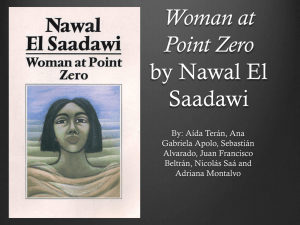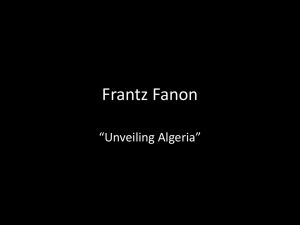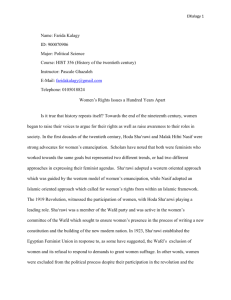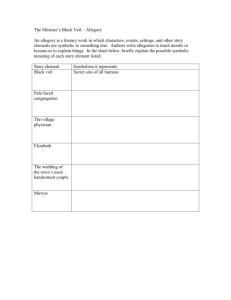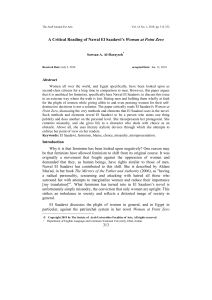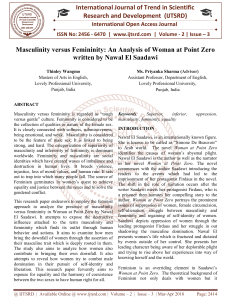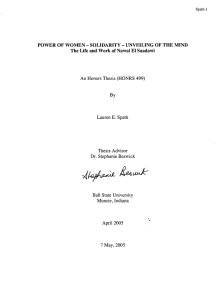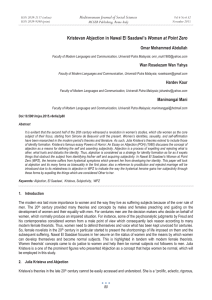Woman at Point Zero by Nawal El Saadawi
advertisement
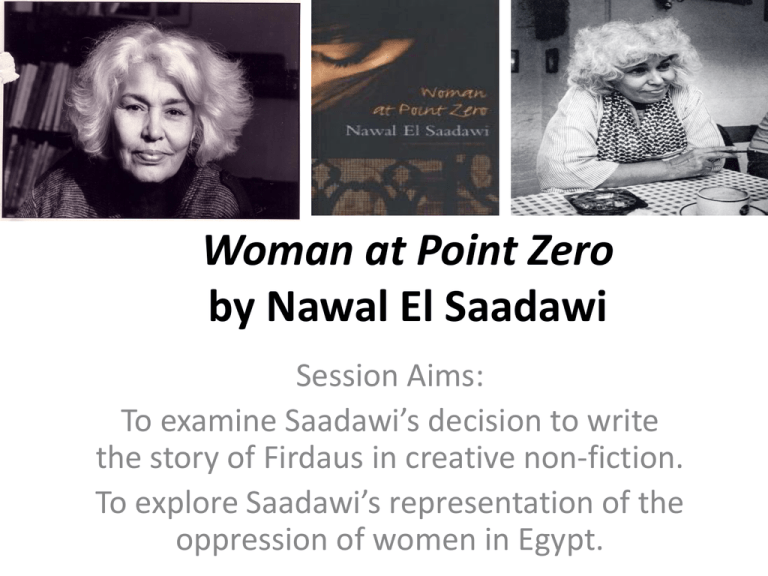
Woman at Point Zero by Nawal El Saadawi Session Aims: To examine Saadawi’s decision to write the story of Firdaus in creative non-fiction. To explore Saadawi’s representation of the oppression of women in Egypt. A SHORT BIOGRAPHY • • Nawal El Saadawi is a world renowned writer. She is a novelist, a psychiatrist, and author of more than forty books. She writes in Arabic and lives in Egypt. Her novels and her books on the situation of women have had a deep effect on successive generations of young women and men over the last five decades. As a result of her literary and scientific writings she has had to face numerous difficulties and even dangers in her life. In 1972, she lost her job in the Egyptian Ministry of Health because of her book “Women and Sex”, which was published in Arabic in Cairo (1969). It was banned by the political and religious authorities because in some chapters of the book she wrote against Female Genital Mutilation (FGM), and linked sexual problems to political and economic oppression. The magazine Health, which she founded and edited for more than three years, was closed down in 1973. In September 1981 President Sadat put her in prison. She was released at the end of November 1981, two months after his assassination. She wrote her book “Memoirs” from the Women’s Prison on a roll of toilet paper with an eyebrow pencil smuggled to her cell by an imprisoned young woman in the prostitutes ward. From 1988 to 1993 her name figured on death lists issued by fanatical religious political organizations. A SHORT BIOGRAPHY • During the summer of 2001, three of her books were banned at Cairo International Book Fair. She was accused of apostasy in 2002 by a fundamentalist lawyer who raised a court case against her to be forcibly divorced from her husband, Dr. Sherif Hetata. She won the case due to Egyptian, Arab and international solidarity. On 28 January, 2007, Nawal El Saadawi and her daughter Mona Helmy, a poet and writer, were accused of apostasy and interrogated by the General Prosecutor in Cairo because of their writing. • They won the case in 2008. Their efforts led to the creation of a new law giving children born outside of marriage the right to carry the name of their mother. FGM was also banned in Egypt in 2008. Nawal El Saadawi has been fighting against FGM for more than fifty years. The Authenticity of the Novel • The first line of the book is “This is the story of a real woman” (1). However, this is a novel, meaning that some parts of it must be fiction, in the foreword she calls it “creative non-fiction” (vii). • Is it problematic that Sadaawi takes it upon herself to fictionalize Firdaus’ experience? • Are there any parts of the novel which you think could be more invented than true? • Does it alter your reading of the novel knowing it may not be entirely true? Firdaus and her problems • List all the problems Firdaus faces. • Is Firdaus’ prostitution a result of the oppression she experiences as a woman? • What is Saadawi’s role in examining female oppression? Her work • Saadawi wrote revolutionary, shocking books on the brutal sexual subjugation of Arab women when in her forties, after working as a doctor in rural Egypt. Her best-known novel Woman at Point Zero (1973) which we are studying, focuses on a prostitute who is sentenced to death for killing her rapist, and The Hidden Face of Eve (1977), which opens on the unblinking description of the clitorodectomy Saadawi underwent aged 6. • The books crackle with righteous fury, depicting a world in which little girls are routinely sexually abused by sex-starved male relatives and mutilated by their mothers in the name of Allah. Breaking these taboos in the 1970’s made her the internationally recognised authority on the status of women in the Arab world and ‘introduced the word feminist into Egyptian culture’. But how do her ideas stand up in a world where ‘throwing off the veil’ has become as anachronistic as ‘burning your bra’? Critical Reactions • Some critics like George Tarabishi have criticised El Saadawi for abstracting her men and women in Woman at Point Zero and reducing them to “one dimensional” characters. Such characterisations, he argues, fail to illuminate complex human relations and therefore “do not make for good literature”. How would you respond to this statement? • Afif Farraj faults El Saadawi for imposing an ideological discourse on the world of literature by shifting between the polemical essay and narrative for presenting her opinion through self-evident statements rather than through layers of events. Other critics have concurred, pointing out that the commitment to women’s liberation overshadows the story, that at times the characters’ statements and thoughts seem inappropriate and forced. Did you feel Firdaus’s narrative was ever unnatural or strained? • George Tarabishi contends Firdaus’s struggle is aimed at “liberating not her female sisters but herself” and her “nihilistic asceticism” is a way to reject reality, not to change it. Whilst he agrees her story is worth telling, he dislikes the way in which an individual isolated case is elevated to a theoretical issue. Do you agree or disagree with this reading? Still Relevant? • Many feel Saadawi no longer deserves to be called the ‘leading spokeswoman on the status of women in the Arab world’. Adhaf Soueif, the Egyptian novelist and cultural commentator, has expressively concurred: “Absolutely not”. • “Nor has she been for the last twenty years. I know women who say she opened their eyes to feminism as we might say about the early iconic feminists writers in any language. But after she was imprisoned along with about 1000 other people, her western career began and from then on her discourse was tailored to the West and she lost touch with her Arab audience.” • What are your initial thoughts on this criticism? Do you agree? Modern Egyptian Women • Soueif echoes a younger generation of Middle-Eastern and Arab women who are proud of their modernity and resent the prominence given to Saadawi’s writing in the West. Manal Lotfi, an Egyptian journalist working in London explains, “She’s brave-charismatic but also aggressive. In such a conservative society she stands up and takes attacks and criticism from many factions. But she doesn’t represent or understand ordinary women, most of whom are religious. There are more Egyptian women in higher education than men now.” 1. When reading Woman at Point Zero do you think Saadawi came across as understanding the plight of “ordinary women”? Consider her feelings for the warder: “She was no more than a woman cleaning the prison floor.” (5) 2. What comparisons does Nawal El Saadawi invite us to make between herself and Firdaus? Saadawi and the Veil • “Women who wear the veil and say they choose to do so are either lying or ignorant.” • Do you think this is a fair view of women who wear the veil? Saadawi and Honour Crimes • “Of course I’m very much against punishment for an honour crime, but this issue is very political because Islam is the enemy of the West and supposedly the only religion which kills women. I disagree with this – killing and violation of women is to be found in Israel and by the US government too for instance.” • What does this comment tell us about Saadawi’s stance? Consider the following questions: 1. In Woman at Point Zero how does the institutionalized degradation of female sexuality effect Firdaus? 2. Has anything been lost in the translation of her work? Do you think it is fair to say that her work is now catered to a Western audience? 3. In Woman at Point Zero do you think she manages to avoid isolating issues of sexuality and patriarchy from class? 4. How do you respond to her claim that: “all women have been circumcised; if not physically then ‘psychologically and educationally’”? Frantz Fanon, “Unveiling Algeria” • ““If we want to destroy the structure of Algerian society, its capacity for resistance, we must first of all conquer the women; we must go and find them behind the veil where they hide themselves and in the houses where the men keep them out of sight.”” (37-8) • “Every new Algerian woman unveiled announced to the occupier an Algerian society whose systems of defense were in the process of dislocation, open and breached. Every veil that fell, every body that became liberated from the traditional embrace of the haik, every face that offered itself to the bold and impatient glance of the occupier, was a negative expression of the fact that Algeria was beginning to deny herself and was accepting the rape of the colonizer.” (42) Fanon’s Thesis • “The Algerian woman is at the heart of the combat. Arrested, tortured, raped, shot down, she testifies to the violence of the occupier and to his inhumanity.” (66) • How can we relate/apply Algeria Unveiled to what we have read so far on this module? Sadia Abbas, "The Echo Chamber of Freedom: The Muslim Woman and the Pretext of Agency" • “The women’s decision to veil very quickly gets manipulated by everyone.” (44) • “the figure of the Muslim woman for whom the metonym is increasingly the veil. The Muslim woman is object of imperial rescue, justification for imperial warfare, Orientalist cipher, target of jihadist violence, and increasingly, the discursive site on which the central preoccupation of our time – how do you free yourself from freedom? – is worked out.” (45) Sadia Abbas’ Thesis • “Agency can be produced out of subordination; choosing subordination can be an exercise of agency; agency is not comprised of acts of resistance but can consist of modes of inhabiting norms.” (67) • “What Muslim women require most is to be freed from “our” freedom.” (70) • How can we relate/apply Echo Chamber of Freedom to what we have read so far on this module? • How do you respond to this argument? Discussion Questions • Read and discuss the questions in small groups and then feedback. Plenary • How does the novel compare to other stories of silenced women we have read? • Can we apply any of the theory we have read to this novel?
